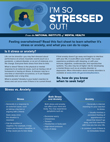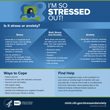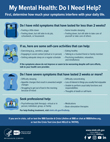Publications about Stress
- I’m So Stressed Out! Fact Sheet
-
This fact sheet is intended for teens and young adults and presents information about stress, anxiety, and ways to cope when feeling overwhelmed.
- I’m So Stressed Out! Infographic
-
A brief social media graphic about stress, anxiety, and ways to cope when feeling overwhelmed.
- My Mental Health: Do I Need Help?
-
Information about assessing your mental health and deciding if you need help. It provides examples of symptoms, self-care activities, and how to seek help.
- Stand Up to Stress!
-
This free coloring and activity book helps kids learn simple ways to manage stress and boost their mental well-being.




